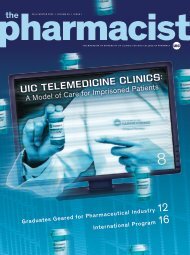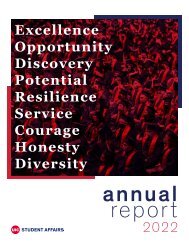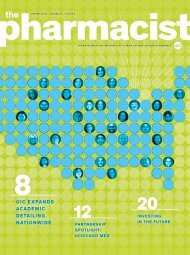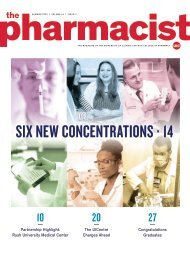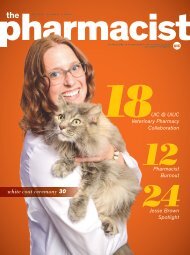The Pharmacist / Spring 2022 / Volume 44 / Issue 2
Magazine of the University of Illinois Chicago College of Pharmacy
Magazine of the University of Illinois Chicago College of Pharmacy
You also want an ePaper? Increase the reach of your titles
YUMPU automatically turns print PDFs into web optimized ePapers that Google loves.
Dr. Steve Lee<br />
DEVELOPING TOOLS TO IMPROVE CANCER<br />
DIAGNOSIS AND TREATMENT<br />
As a chemical engineering undergraduate student,<br />
Dr. Steve Lee readily admits cancer research didn’t<br />
register on his radar. When a beloved uncle passed<br />
away in 2014 of lung cancer, however, the prospects of<br />
improving cancer diagnosis and treatment options took<br />
on added meaning.<br />
Lee, an assistant professor in the Department of<br />
Pharmaceutical Sciences, has spent recent years<br />
leveraging his engineering background to develop new<br />
tools and methods for drug delivery research, including<br />
the creation of a microscopic tool that enables 3D tissue<br />
image sampling at cellular resolution. <strong>The</strong> innovation<br />
allows investigators to view both the cancer cell and the<br />
cancer drug in the same tissue in 3D, which can provide<br />
clinicians richer insights into how a specific drug is<br />
attacking a cancerous cell.<br />
“With this knowledge, we can then modify drugs<br />
chemically or genetically so more of the drug goes<br />
to the cancerous cells,” says Lee, who is also trying to<br />
integrate his lab’s microscopic technique with other<br />
tissue assay technologies.<br />
While Lee says his mother’s recent brain cancer<br />
diagnosis has brought an added layer of urgency and<br />
motivation to his work, he also finds inspiration in UIC<br />
colleagues like Dr. Debra Tonetti who have seen their<br />
cancer drug candidates enter clinical trials and march<br />
toward marketplace acceptance.<br />
“This is personal for me,” Lee says. “I want to move<br />
research from the bench to the clinic and impact lives.”<br />
A RESEARCH SHIFT FUELED FROM THE<br />
PAIN OF LOSS<br />
For much of his professional scientific career, Dr. Tom<br />
Gao worked on large-scale research of proteins and<br />
peptides, including predictive work regarding the<br />
potential side effects and toxicities of certain drug<br />
interactions. Four years ago, though, Gao’s research<br />
interests shifted after his grandmother passed from<br />
metastatic melanoma—28 years after she faced her<br />
initial diagnosis and treatment of the same disease.<br />
“We all thought it was gone, but cancer’s a sneaky disease,”<br />
Gao says. “She was already in stage IV metastatic cancer<br />
when diagnosed this time, and it was too late.”<br />
Noting the need for an accessible, easy-toperform<br />
test for early diagnosis, Gao has<br />
shifted part of his research focus to cancer diagnostics.<br />
Specifically, Gao and colleagues have developed a novel<br />
liquid biopsy method, a less invasive, better tolerated<br />
procedure designed to improve detection and treatment.<br />
In a current collaboration with UI Health and Pfizer,<br />
Gao’s team is using machine learning to predict, via<br />
exosomes separated from blood and with greater<br />
than 90% accuracy, the breast cancer patients best<br />
positioned to respond to specific treatments. Gao, an<br />
assistant professor in the Department of Pharmaceutical<br />
Sciences, anticipates publishing the findings of this<br />
work in the first half of <strong>2022</strong>.<br />
“Think of the time we gain if we can perform better<br />
diagnosis and treatment on everyone,” Gao says.<br />
“If successful, we will bring something great to<br />
this world.”<br />
HAVING AN IMMEDIATE IMPACT<br />
ON PATIENTS<br />
After earning his PharmD degree in<br />
2012, Dr. Eric Wenzler envisioned<br />
a fruitful clinical career. After two<br />
years of residency and three years<br />
of fellowship, though, Wenzler<br />
realized the best researchers are good<br />
clinicians and vice versa.<br />
“We identify unmet needs on the clinical<br />
side and immediately utilize our research<br />
skills and knowledge to solve those<br />
problems,” Wenzler says.<br />
Improved alignment between the bench<br />
and the bedside has been Wenzler’s<br />
dominant focus since joining UIC’s faculty<br />
ranks in 2017 as an assistant professor<br />
in the Department of Pharmacy Practice.<br />
Specifically, Wenzler and his sevenmember<br />
lab team investigate optimal use<br />
of existing antibiotic combinations against<br />
super resistant gram-negative pathogens<br />
for which there are no currently viable<br />
treatment options.<br />
Dr. Zack<br />
One notable example: Seeing no clear<br />
Bulman<br />
antibiotic recommendations for patients on continuous<br />
renal replacement therapy (CRRT) facing bacterial<br />
infections, Wenzler and his team began examining<br />
the use of a niche antibiotic called cefiderocol.<br />
Following in vitro studies in Wenzler’s lab<br />
as well as patient modeling, the Wenzler-<br />
Dr. Eric Wenzler<br />
Dr. Tom Gao<br />
14 THE PHARMACIST PHARMACY.UIC.EDU




